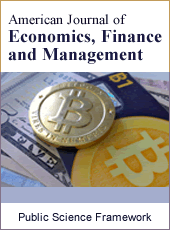American Journal of Economics, Finance and Management
Articles Information
American Journal of Economics, Finance and Management, Vol.1, No.5, Oct. 2015, Pub. Date: Aug. 3, 2015
Factoring as Financing Alternative: Reasons for Non Patronage in Nigeria
Pages: 503-509 Views: 5355 Downloads: 2020
[01]
Alayemi S. A., Faculty of Business and Social Sciences, Department of Accounting, Adeleke University, Ede, Osun State, Nigeria.
[02]
Oyeleye O. A., Faculty of Business and Social Sciences, Department of Accounting, Adeleke University, Ede, Osun State, Nigeria.
[03]
Adeoye E. T., Faculty of Business and Social Sciences, Department of Accounting, Adeleke University, Ede, Osun State, Nigeria.
This paper examined factoring as alternative source of finance and the reasons why it is not patronized in Nigeria. The objective of this paper was to explore factoring as a source of finance an alternative source of finance instead of bank loan with its attendant high interest rate. Factoring makes it possible for business to readily convert a substantial portion of its account receivable into cash. Factoring; the world all over has become a growing source of external finance for corporations and small and medium size enterprise. Depending on the participant, factoring may be domestic or international. There are two principal methods of factoring. Factoring can be with recourse where the client is not protected against the risk of bad debt. Hence, in the case of uncollectable debt, the client bears the loss. The other one is factoring without recourse. Under this scenario, the uncollectible debt is bore by the factor. However, factor should not be seen as debt collector. In the case of Nigeria, this method of finance is not patronized because of the state of the economic situation, incompetence of financial system in allocating financial resources and weak legal system which are features of emerging market. The determinants of the level of factoring activity in an economy depends on first, the availability of financial information about enterprises; and second, the overall level of economic activity. The reasons why factoring as an alternative source of finance is not embraced is simply because Nigeria is an emerging market where our financial system is not efficient coupled with the weak legal system. This is coupled with our political system that do not create an enabling atmosphere for smooth operation of financial institutions and Nigeria legal system.
Factoring, Account Receivables, Factoring with Recourse, Factoring Without Recourse, Bad Debt, Emerging Market
[01]
Berger, A., Udell, G. (2004). A more complete conceptual framework for SME finance, The W Bank, MC 13-121.
[02]
Bakket, M.H.R., Klapper, L., Udell, G.F (2004). Financing small and medium-size enterprises with factoring: Global growth in factoring - and its potential in Eastern Europe, The World Bank, Warsaw, Poland.
[03]
Biscoe, P. N. (1975). Law and practice of credit factoring. Butterworth & Company, 5
[04]
Bushman, R.M., Smith, A. J. (2003). Transparency, financial accounting information, and corporate governance, Economic Policy Review, Vol. 9, pp. 65-87,
[05]
Daniel, J. B., Mushfiq, S., Travis, L. S and Shelton Week, H. (2010). Accounts receivable factoring as a response to weak governance: Panel Data Evidence. International Business and Economics Research Journal. Vol., No.2; 1-12
[06]
Demirguc-Kunt, A., Maksimovic, V. (2002). Firms as financial intermediaries: evidence from trade credit data, World Bank working paper.
[07]
FCI. Factors Chain International [online] [cit. 2012‐04‐07], Available from: http://www.fci.nl/about‐fci.
[08]
Fisman, R., Love, I. (2003). Trade credit, financial intermediary development, and industry growth. Journal of Finance 58, 353-374.
[09]
Fisman, R., Raturi, M., 2004. Does competition encourage credit provision? Evidence from African trade credit relationships. Review of Economics and Statistics 86, 345-52.
[10]
Jaroslava, Janeková (2012). Factoring – alternative source of a company financing. International Journal of Engineering, FASCICULE 3 (ISSN 1584-2673), 303-306.
[11]
Klapper, L., Determinants of global factoring, The World Bank, 2000.
[12]
Klapper, L. (2005). The role of factoring for financing small and medium enterprise. Policy Research Working Paper Series 3593, The World Bank.
[13]
Klapper, L. (2006). The role of factoring for financing small and medium enterprises, Journal of Banking & Finance, Vol. 30, pp. 3111-3130.
[14]
Litan, R.E., Pomerleano, M., Sundararajan, V., Strengthening financial sector governance in emerging markets, in: Litan, R.E., Pomerleano, M., Sundararajan, V. (Eds.), Financial Sector Governance: The Roles of the Public and Private Sectors, Brookings Institution Press, Washington, D.C., pp. 1-13, 2002.
[15]
Lotz, B. (1992). Factoring may boost your company’s cash flow. Business Credit, Vol. 94, No. 7, 38-39.
[16]
Mian, S.L., Smith, C. (1992). Accounts receivable management policy: Theory and evidence, Journal of Finance, Vol. 47, No. 1, 169-200.
[17]
McMillan, J., Woodruff, C., 1999. Inter-firm relationships and informal credit in Vietnam. Quarterly Journal of Economics 114, 1285-1320.
[18]
Schumpeter, J.A. (1911). The theory of economic development, Harvard University Press, Cambridge.
[19]
Smith J., Schnucker, C. (1994). An empirical examination of the organizational structure: The economics of the factoring decision, The Journal of Corporate Finance: Contracting, Governance and Organization, Vol. 1, No. 1, pp. 1119-138.
[20]
Sopranzetti, B. J., 1998. The economics of factoring accounts receivable. Journal of Economics and Business 50, 339-359.
[21]
Sufi Amir, 2007. Information Asymmetry and Financing Arrangements: Evidence from Syndicated Loans, Journal of Finance 62 (2): 629-668.
[22]
Van Horen, N., 2004. Do firms use trade credit as a competitiveness tool? Evidence from developing countries, World Bank mimeo.

ISSN Print: 2381-6864
ISSN Online: 2381-6902
Current Issue:
Vol. 5, Issue 3, September Submit a Manuscript Join Editorial Board Join Reviewer Team
ISSN Online: 2381-6902
Current Issue:
Vol. 5, Issue 3, September Submit a Manuscript Join Editorial Board Join Reviewer Team
| About This Journal |
| All Issues |
| Open Access |
| Indexing |
| Payment Information |
| Author Guidelines |
| Review Process |
| Publication Ethics |
| Editorial Board |
| Peer Reviewers |


